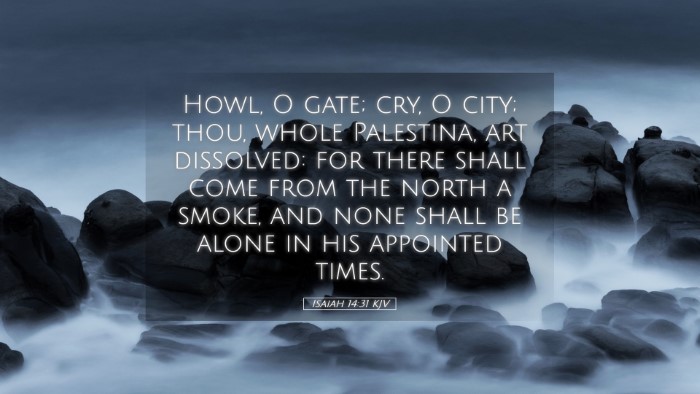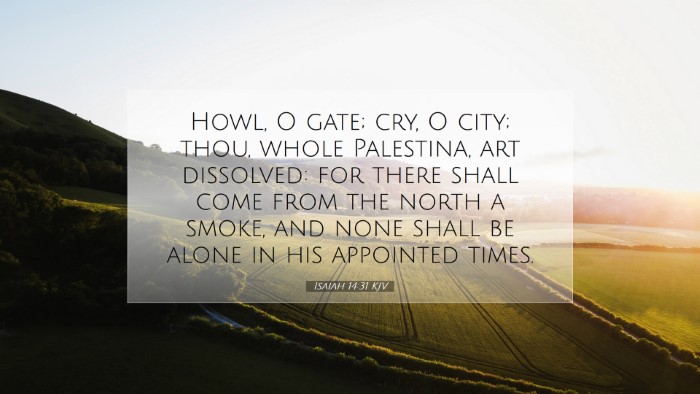Commentary on Isaiah 14:31
Isaiah 14:31 states:
"Howl, O gate; cry, O city; thou, whole Palestina, art dissolved: for there shall come from the north a smoke, and none shall be alone in his appointed times."
Contextual Overview
The verse is situated within a broader prophetic passage that addresses the downfall of Babylon and ultimately the judgment upon the enemies of God’s people. Isaiah speaks a message of comfort and hope for Israel while denouncing the pride and arrogance of those nations that have oppressed them.
Thematic Elements
- Judgment and Desolation: The verse opens with a call to lamentation, indicating the profound sense of loss and helplessness that will engulf the inhabitants of Palestine as God’s judgment approaches.
- Imminent Threat: The "smoke from the north" symbolizes impending destruction and the invading armies that will come as instruments of divine judgment.
- Universal Impact: The phrase “none shall be alone” suggests that judgment will affect everyone across the region—indicating the exhaustive reach of God’s decree.
Commentary Insights
In gathering insights from several public domain commentaries, we can extract nuanced interpretations related to the verse:
Matthew Henry's Commentary
Henry underscores the painful lamentation that is to occur in the cities of Palestine. He notes that the gates and cities represent the places of human pride and enterprise. This howl signifies an awakening to the reality of divine judgment where the security that cities and fortifications offered will no longer stand. Henry emphasizes that it is not merely the physical destruction but the spiritual desolation that results from divine abandonment.
Albert Barnes' Notes on the Bible
Barnes elaborates on the imagery in this verse. He points out that 'the north' in ancient scripture often carries a connotation of approaching invaders, most notably the Assyrians or Babylonians, who are God’s tools for executing His will. He mentions that the term “smoke” enhances the sense of dread and foreboding associated with invasion. For Barnes, this serves as a reminder that God orchestrates the rise and fall of nations, and His sovereignty is paramount even amidst chaos.
Adam Clarke's Commentary
Clarke provides a detailed exploration of the geographical and cultural implications of the verse. He notes that 'Palestina' refers to the Philistine territories, and he highlights the historical context of these nations often opposing Israel. The invitation to “howl” reflects a deep existential fear that comes with the acknowledgment of impending doom. Clarke emphasizes the prophetic nature of this verse as anticipating a time when these nations will experience the consequences of their actions against God’s chosen people.
Application and Reflection
This passage encourages reflection on the themes of divine justice and the inevitable judgment that follows pride and oppression. For pastors and theologians, it serves as a warning against the false sense of security that reliance on human strength can bring. Students of Scripture are reminded that history is ultimately under God’s control, and the trajectory of nations is subject to His divine will.
Lessons for Today
- Heed the Warnings of Prophecy: Just as Israel was called to attention in the face of impending judgment, so must we remain vigilant in our spiritual lives, acknowledging signs of divine displeasure within our own societies.
- Seek Divine Justice: In a world rife with injustice and oppression, believers are called to trust in God as the righteous judge, advocating for the oppressed while bearing witness to the need for repentance.
- Embrace Humility: The futility of human pride and plans is starkly highlighted. Both individuals and nations are urged to seek humility before God and recognize our dependence on His grace.


